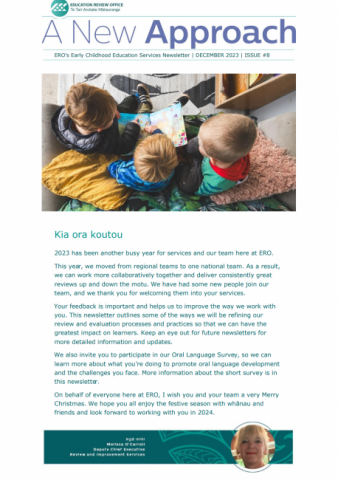

Kia ora koutou
2023 has been another busy year for services and our team here at ERO. This year, we moved from regional teams to one national team. As a result, we can work more collaboratively together and deliver consistently great reviews up and down the motu. We have had some new people join our team, and we thank you for welcoming them into your services.
Your feedback is important and helps us to improve the way we work with you. This newsletter outlines some of the ways we will be refining our review and evaluation processes and practices so that we can have the greatest impact on learners. Keep an eye out for future newsletters for more detailed information and updates.
We also invite you to participate in our Oral Language Survey, so we can learn more about what you’re doing to promote oral language development and the challenges you face. More information about the short survey is in this newsletter. On behalf of everyone here at ERO, I wish you and your team a very Merry Christmas. We hope you all enjoy the festive season with whānau and friends and look forward to working with you in 2024.

What’s coming in 2024?
We have recently reviewed our systems, processes, and practices for how we implement Akanuku | Assurance Review and Akarangi | Quality Evaluation. While many of you are positive about the evaluation process, we have identified some areas where our practices could improve.
Moving forward, changes that affect you include:
ERO visits
We will notify you of an upcoming ERO visit, rather than the specific type of review. Once our review team checks some important components of compliance, they will determine the “best fit” review or evaluation at that time i.e., Akanuku | Assurance Review or an Akarangi | Quality Evaluation.
We will begin our visits with assessment of the licensing criteria where noncompliance would be considered an immediate and unacceptable risk. This includes requesting for a range of specific policies and procedures to be provided to us in preparation for our visit. Regular review of compliance requirements should reduce the time taken to assess compliance.
The self-review checklist that is part of the Assurance Statement aligns to the ECE Regulatory Standards and licensing criteria. This is an opportunity for you to revisit and check leaders' and staff practices before we arrive. This will help us to collectively reduce non-compliances and enable us to spend more focused time on quality provision.
Reporting
Our final overall judgements (emerging, establishing, embedding or sustaining) will be shared with you in your unconfirmed report, rather than at the last meeting before the review team leaves your service.
All reports and files go through a rigorous quality assurance process, and the report judgements will be finalised as part of this.
You will still have an opportunity to provide additional evidence in response to any errors of fact before the report is confirmed.
Improvement Framework
An Improvement Framework for teacher-led services has been developed. This framework draws on ERO’s quality indicators and Te Whāriki and will help you to better understand and identify your next steps on a quality continuum. Your review team will introduce this framework during the review. The Improvement Framework will be on our website next year.
Governing Organisations
This year, we hit the ground running with our new approach to reviewing governing organisations that have oversight of 15 or more individual services. From 2024, all Kindergarten Association, regardless of size, will be part of this approach. You might be surprised to know that governing organisations represent 30% of all early childhood services. Our governing organisation reviews focus on what the governing organisation knows about its services’ performance, the role the organisation plays in supporting each service’s continuous improvement journey, and evaluating system-wide approaches that the governing organisation has in place.
Oral Language Survey
ERO is undertaking some research to understand how children’s oral language skills are developing in the early years. We want to know what kaiako or teachers do to promote oral language development and the challenges you face. The findings from these surveys will inform future actions to improve oral language outcomes for our tamariki.
Why participate?
By participating in the survey, you, your kaiako or teachers, parents and whānau will be able to have a say in this research. Both the surveys are quick five-minute surveys and will help us understand what is working well and what needs to change.
Please note, this is not an evaluation of your early learning service(s) or kaiako and teachers. All the information from the surveys will be combined and no individual service information will be published in the report.
What is involved for your service(s)?
If you are happy for your early learning service(s) to take part in this national research project, please follow the instructions below:
1. Please forward the survey link below to all the kaiako and / or teachers in your early learning service(s).
https://www.surveymonkey.com/r/326DF2L
2. Please share the link below with all parents and whānau who have children currently enrolled in your early learning service(s).
https://www.surveymonkey.com/r/96JYDQN
Both the surveys are short and should only take about five minutes. We look forward to your responses and thank you for your help and support this project to improve oral language outcomes for children.

For more information about ERO and our mahi please visit ero.govt.nz To be added to our mailing list for this newsletter, please email us at ricomms@ero.govt.nz